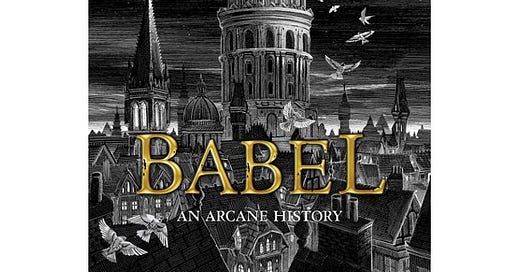Published: 2022 | Pages: 545
Happy Friday Readers!
This book is unlike any story I’ve read before.
While I’m not hands-down recommending it to all and everyone, I have enjoyed telling people about it because the story is so gosh darn original.
What’s it about?
Babel is a work of fiction set in 1830’s Oxford, but with a magical element that is just plain cool. Some of you might get turned off by the word “magic,” but this is no Harry Potter. These students aren’t waving wands; the “magic system” is this clever idea that, while fun to explain, is more fun to discover while reading. It serves as the technological advantage of the British Empire and keeping it functioning requires a mastery of languages. This makes the students at Oxford’s Royal Institute of Translation, known as Babel, extremely valuable.
Four students at the Institute - Robin, Ramy, Victoire, and Letty - are our protagonists and their friendship is the emotional core of the story. They are gender and ethnic minorities at a time and place that is predominantly male and white. They were chosen for the Institute for their abilities to learn languages and translate for the Empire. They are given every resource they need to succeed in school and go on to serve the Empire in a lucrative career.
But there’s a rub. It’s all a little too good to be true. And that’s all I’m going to say about the plot.
Why read it?
Let’s start with that cover. It’s gorgeous, isn’t it? Nico Delort did the artwork of the tower of Babel rising above the Oxford skyline. This is a great example of a title and cover tying in perfectly with the essence/mood/tone of the story itself.
Another reason is it will lodge itself in your brain. From the cover, to the fantastical elements, to the social commentary, I can’t imagine ever forgetting this book.
In a similar way that Octavia Butler’s unforgettable Kindred brewed the horrors of slavery with an element of fantasy, so does Babel with the horrors of colonialism, racism, and exploitation. The fantasy element serves to drive the point home in a memorable way.
When read it?
While I don’t consider this a “Drop everything and read this now!” book, definitely check it out later if it sounds interesting to you. While I’m convinced I’ll never forget it, I’m curious to see if that holds true and how well it will hold up culturally over time.
(Adapting for TV or film) is an act of betrayal
Finally, this book gave me some new language with which to discuss book adaptations. Replace translation with adapting a book for TV or film in the quote below:
What is the opposite of fidelity? Betrayal. Translation means doing violence upon the original, means warping and distorting it for foreign, unintended eyes. So then where does that leave us? How can we conclude, except by acknowledging that an act of translation is then necessarily always an act of betrayal?
Have you read Babel? If so, what did you think?
Thanks for reading,
Kyle
P.S. - Even though it will be a betrayal, I hope this does get adapted. It would make a great single season series with possibilities for more seasons based on that ending!





A teaser. Reading Jeremy’s 52 weeks of War and Peace. Thanks to you both for leading me to books . Not sure if I will get to Babel anytime soon.
Jean
You and Jeremy! I can’t keep up. Just finished Frankenstein. Not a disappointing read. With Jeremy’s recommendation I purchased Klinger’s annotated edition. The annotations kept distracting me while reading 🙄
I will skim them now.
A new follower,
Jean